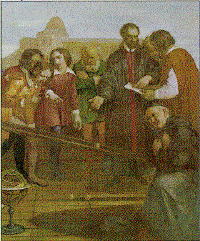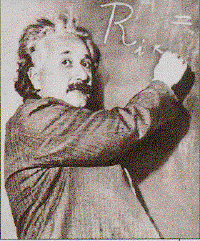Science: Twilight of Faith
Chapter One
Millions of species share this planet. But only we humans have developed science and religion. Only we have tried to understand the world around us and looked for purpose in life. Only we ask who, why, what, when, where and how.
What sets us apart from all other species on earth is the awesome power of our minds. It drives us to want to know and to understand. That is why we build cathedrals, temples and churches. That is also why we peer through microscopes, build particle accelerators and send space probes to the farthest reaches of the solar system and beyond.
 |
| Two of the world’s greatest scientists, Galileo Galilei (above) and Albert Einstein (below), helped pioneer new ways of thinking about the universe and our place in it. |
 |
Our early ancestors recognized a basic symmetry and consistency in heaven and earth. The sun came up every morning. The moon waxed and waned. The stars and planets followed their courses through the heavens. Leaves changed color every autumn. New growth burst forth in the spring.
People saw this as evidence that they and their world were in the hands of God — or the gods — and all was well.
Out of the Shadows
Most people lived fairly simple, predictable lives. They planted their crops, or worked at the trade they had been taught and that they in turn would teach their children. The average person could not read or write, and knew little of the world outside the immediate community. Everyone had a place in society — the rich, the poor, even the servant or slave. That was the way it had always been, and the way they thought it would always be.
If they had questions, they could ask the priest, or the shaman or the witch doctor, who knew what was necessary about life, death and the purpose of existence. Religion was assumed to have the answers to the really important questions.
But a few have always thought more deeply and asked probing questions. Why is it this way? How does the universe work? What is the meaning of the creation — and of life itself?
For most of recorded history, scientists were viewed as rather eccentric figures on the fringes of normal society. They seemed to spend their time looking for the elixir of life, or trying to turn lead into gold, or doing unfathomable things with astronomical charts. Science, or what passed for science, didn’t have much to do with the average person.
In general, however, the early scientist-philosophers of the Western world were bound by a deep respect for tradition, especially sacred tradition. They went about their work in the spirit of investigating their Creator’s handiwork. Their humble efforts could only supplement — and certainly never challenge — the majestic revealed truths of the Bible, as interpreted by the authorities of the church.
Gradually, however, a gulf opened between science and religion in the West. About 300 years ago, scientists began to move out of the shadows and onto center stage. The influence of religion slowly, but decisively, decreased. Technology began to change the way we lived, but more significantly, it changed the way we thought about ourselves. We could now alter the environment. No longer were we nature’s pawn, and the dogmatic, often simplistic explanations of religion no longer satisfied.
The theologian gradually became the rather incongruous figure on the edge of society. His well-meaning efforts to help seemed less and less relevant with every passing decade of progress. Everything really important could apparently be explained without him. After centuries of groping in the dark, it was the scientists, not the theologians, who emerged with answers. They gave us new insights. They performed the miracles. They lightened our burdens and brought us new truths. There was less need to rely on the concept of God to explain the existence and functioning of the universe.
The thinking developed that everything could be studied and explained by science. Physicists, chemists, biologists, geologists confidently gave answers while the church seemed to become more and more out of touch with the needs of the real world.
A Strange New World
But then, about the end of the 19th century, scientists who were studying the deepest mysteries of matter and energy were confronted with a whole new way of looking at the world. As physicists probed the vastness of space and the heart of the atom, what they discovered was so different, so fantastic and utterly unexpected that it seemed to defy all common sense, all logic and all reason.
| “I want to know [God’s] thoughts; the rest are details” — Albert Einstein |
Most of us still see ourselves as living in a predictable three-dimensional world, surrounded by familiar, solid objects. Up is up, down is down, and we usually know what time it is. But the “new physics” is telling us that this may not be the way it is at all. Our everyday world may be, at the fundamental level, a very peculiar place. The most common object — a pen, a wooden spoon, or this brochure — may be in reality a pulsating, shimmering field of energy, held in check by mighty forces that prevent it from coming apart.
Today, those who work with high-energy physics, probing the beginning of time and the ultimate building blocks of the universe, are finding that they may be hitting barriers where practical experiments can go no further.
It is an interesting state of affairs. After several decades of astounding discoveries, some physicists in the high-energy field admit they may be reaching the end of their experimental rope. Research at the leading edge must be carried out in the laboratory of the mind, where the tools are those of the intellect (reinforced by horrendously complicated mathematics). But this has led some scientists into territory that has typically been the preserve of the philosopher and theologian, whose jobs have traditionally been to explain what cannot be adequately understood by experiment and observation.
| “As we acquire more knowledge, things do not become more comprehensible but more mysterious.” — Albert Schweitzer |
Religion, however, seems to be on the defensive. And tragically, the Bible, once acknowledged as the revelation of God’s will, has been criticized, doubted and downgraded.
Yet, when properly understood, the Bible adds a vital dimension to the questions being raised by those who are pushing the frontiers of knowledge. We need to look at the Bible and see if its ancient light can illuminate the remarkable mysteries we ponder today.
But first, let’s take a brief look at the history of religion and science, and understand why a gulf opened up between them.

